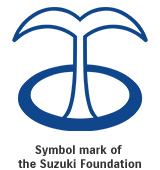Suzuki Foundation Announces Research Funding for Fiscal 2019
- Total disbursements of ¥175.28 million
- Of which 58 research funding worth a total of ¥131.35 million
On 21 February 2020, the Suzuki Foundation (Chairman: Osamu Suzuki) selected 58 scientific technology and proposed subject research initiatives from universities and other research institutes in Japan to receive fiscal 2019 financial assistance worth a total of ¥131.35 million. The Foundation also announced other financial assistance, bringing its overall fiscal 2019 disbursements to ¥175.28 million.
| Financial assistance for fiscal 2019 | Number of assistance |
Disbursements |
|---|---|---|
| (1) Scientific technology research projects: | ||
| General researcher | 29 | ¥68.15 million |
| Young researcher | 25 | ¥25.00 million |
| (2) Proposed subject research projects | 4 | ¥38.20 million |
| Total of (1) + (2) | 58 | ¥131.35 million |
| (3) Promoting awareness of research results | 52 | ¥11.38 million |
| (4) Subsidizing overseas researches | 4 | ¥32.55 million |
| Total amount of disbursements | 114 | ¥175.28 million |
(1) Financial assistance for scientific technology research projects
The Suzuki Foundation has decided to support a total of 54 (29 for general researchers and 25 for young researchers aged 35 or younger) original, advanced scientific technology research projects on eight fields: production technologies; environmental and resource energy technologies; measurement, control, and analysis technologies; material technologies; electric, electronics, and information technologies; human engineering and medical technologies; robot technologies; and recycling technologies. The Foundation’s financial assistance for these 54 projects totals ¥93.15 million.
(2) Financial assistance for proposed subject research projects
As well as supporting fundamental and original research projects in the field of natural sciences, since fiscal 2003, the Suzuki Foundation has been selecting contemporary problems that it believes need to be resolved, inviting proposals for research projects to address them, and selecting the most outstanding proposals for funding. It funds each selected project for two years and has selected 33 projects in the past 17 years.
For fiscal 2019, the Foundation has decided to fund the following four researches that lead to innovative weight reduction of transportation, which is represented by automobiles, for the preservation of global environment and the conservation of energy resources.
- 1) Development of Fundamental Technology for All-solid-state Aluminum-ion Battery
- 2) Investigation of Uni-aluminum Alloy for Plastic Forming and Casting, and Process Saving of Plastic Forming using Cast Near Net-shape Blank
- 3) Development of High-Durability Adhesive Material based on Interfacial Analysis for Molecular Structure and Dynamics
- 4) Development of Tailoring Method using Local Thickening and Strengthening with Ausforming
The Foundation will disburse a total of ¥38.20 million for these four projects and for the second year of funding for four projects that it selected in the previous year.
(3) Financial assistance for promoting awareness of research results
The Suzuki Foundation promotes awareness of research results and further development of research projects by funding symposiums and forums held in Japan and overseas. For this fiscal year, the Foundation made seven financial assistances for such purposes. Also, it made 45 financial assistances for subsidizing transportation and accommodation for researchers in Japan to attend overseas academic meetings.
(4) Financial assistance for subsidizing overseas researches
Since fiscal 2016, the Suzuki Foundation has been making supports for equipment and facilities for the International Automobile Centre of Excellence (i-ACE) located in Gujarat, India, toward its opening in March 2020. The Foundation will make financial assistance of ¥23.00 million for this fiscal year.
Also, the Foundation is subsidizing programs in Japan for accepting researchers from India and Hungary. For this fiscal year, it accepted two researchers from Indian Institute of Technology, Hyderabad to Shizuoka University, one researcher from Indian Institute of Science, Delhi to Toyohashi University of Technology, and one researcher from Budapest University of Technology and Economics to Shizuoka University.
About the Suzuki Foundation
Suzuki Motor Corporation established the Suzuki Foundation in March 1980 to mark its 60th anniversary. The latest round of financial assistance for scientific research is the 40th to be announced by the Foundation.
| Chairman | Osamu Suzuki (Representative Director and Chairman of Suzuki Motor Corporation) |
 |
| Location | Tokyo, Japan | |
| Total number of assistance | 1,793 | |
| Accumulated amount of financial assistance | ¥2,117.15 million | |
| Total assets | Approx. ¥10,840.88 million (as of the end of March 2019) |
|
| Goals | The Suzuki Foundation aims to contribute to the development of the Japanese machinery industry and to the national welfare by supporting scientific research related to the production and use of machinery and by disseminating the fruits of such research to the general public. | |
